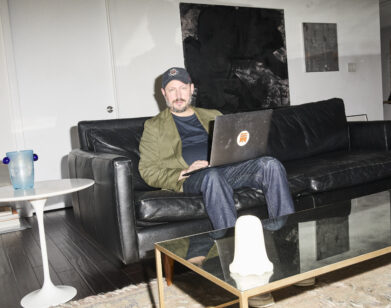ASK A SANE PERSON
David Rothkopf Finds Hope in the History of Progress

If the title of David Rothkopf’s latest political tour-de-force, Traitor, isn’t enough of a condemnation on our current president, then the book’s subtitle goes right to the heart of the indictment: “A History of American Betrayal from Benedict Arnold to Donald Trump.” Rothkopf, one of the country’s most erudite and convincing political commentators and historians on the machinations of power, maps out just how much our current president has abused his power and put his own ambitions—and the interests of foreign countries—ahead of the people he was elected to protect. As Rothkopf’s book makes clear, Trump hasn’t been the first American politician to serve himself while sitting at the top. Rothkopf, an expert on national security and foreign affairs who worked in the Clinton Administration, can also be heard on the Deep State Radio podcast, which aims to be an “antidote to lunacy.” If there’s ever a need for a cure, it’s now.
———
INTERVIEW: Where are you and how long have you been isolating?
DAVID ROTHKOPF: We live in the West Village. We moved in just before the lockdown and have, for the most part, been here throughout.
INTERVIEW: What has this pandemic confirmed or altered about your view of society?
ROTHKOPF: It has, of course, shaken my faith in the U.S. government. The scope of its failures was exceeded only by the depravity and incompetence of Trump & Co. But the rest of society has responded well, with resilience and creativity and, generally, a very positive, problem-solving spirit. Walking around the Village and Soho these days, with all the outdoor restaurants, reminds me that New Yorkers are adapting as they always do, and that’s inspiring.
INTERVIEW: What is the worst-case scenario for the future?
ROTHKOPF: I’m more concerned about the root causes of our political problems than I am about the virus. We will manage that. A vaccine will be found. 2021 will be another tough year. I am optimistic that the government, with new leadership, will be more responsive and respectful of science, more compassionate and capable. But even with Trump gone, I worry that the roots of Trumpism and the red-state v. blue-state divide in the U.S. will deepen and that does not bode well for the country and its institutions.
INTERVIEW: What good can come out of this lockdown? Are there any reasons to hope?
ROTHKOPF: The lockdown has forced people and businesses to innovate. Some habits will be permanently changed—and that could, in certain cases, be for the better. For example, tele-working can cut commutes and lead to better work-life balance. People are likely to be more attuned to the importance of the health and security of the nation. And entrepreneurs will create, as they have, new businesses, new ways to make this altered lifestyle easier and more enriching. I worry about the arts—especially live performance—and the lasting impact to our culture. We are not prioritizing that as we should and I hope that we start to as we recognize the costs of losing what is at risk.
INTERVIEW: What has been your daily routine during this time?
ROTHKOPF: My wife and I get up early and, after breakfast and walking the dog, we each go to our offices in the house and spend the day at work. As a writer and someone who runs a small media company that does a lot of podcasting, technology has made remote work fairly easy. We work out as close to every day as possible and have been very fortunate to have the city at our feet for long walks with each other and our dog, Grizzly.
INTERVIEW: Describe the current state of your hair?
ROTHKOPF: Cut. There is a barber at the corner.
INTERVIEW: On a scale of 1 to 10, what is your level of panic about the current state of the world.
ROTHKOPF: I’m not panicked at all. This is life. We are adapting. Progress is better than the alternatives and I am optimistic about the future.
INTERVIEW: Do you think there is hope for true racial equality in the United States? What do you think is the first step in that goal?
ROTHKOPF: I believe that over the past decades we have made progress, however inadequate. But I am encouraged by rising awareness of these issues now. More importantly, demographic change will dictate social change. By 2043 or so, the groups we once thought of as minorities will become the majority. My greatest concern is that in the interim there will be resistance to this inevitable change from those who feel most threatened by it—as we have seen in recent years.
INTERVIEW: Do you think protests are effective tools for changing the system? How does it make a difference in the long term?
ROTHKOPF: Protest is essential to change. Free expression is essential to change. They are part of our system. The country was actually born of protest. We must welcome it and recognize that organizing and activism are as essential to the functioning of our democracy as voting and the institutions of government.
INTERVIEW: How do you personally channel your anger? Do you find anger to be a useful emotion?
ROTHKOPF: If you are not angry, you’re not paying attention. The trick is constructively channeling that anger. Focus on positive change, set goals, have metrics to measure your progress.
INTERVIEW: Which young leaders of the moment inspire you?
ROTHKOPF: There are so many. I believe it is time for the torch to be passed from the boomers—who have done a pretty lousy job of stewardship. Next generation leaders, like AOC, have an essential role to play, as do emerging new voices like Rep. Katie Porter. But most important are new ideas. Elizabeth Warren, over 70, remains a source of such new thinking so I consider her essential as I do mainstream political leaders like Kamala Harris.
INTERVIEW: What’s the next step after protests in the streets? Where does the righteous rage go?
ROTHKOPF: Occupy Wall Street illustrated that a movement without concrete goals is a waste of energy. The key is to identify the changes you want and work both inside and outside of the system to produce them.
INTERVIEW: What thinker have you taken comfort in of late and why?
ROTHKOPF: The lockdown has given me an opportunity to re-immerse myself in a wide variety of books so it is hard to identify one. I’ve read Thomas Paine (speaking of the voice of protest) and The Federalist Papers and a lot of Shakespeare, which has always been a constant in my life. Most recently, just now, I was reading [Samuel Taylor] Coleridge. I guess the main point is finding sources of philosophical and spiritual grounding and insight.
INTERVIEW: If 2020 were a song, which song would it be?
ROTHKOPF: The first thing to come to mind was the old tune that goes, “It’s not where you start, it’s where you finish.”
INTERVIEW: Where did we go wrong? Like, what was the exact moment?
ROTHKOPF: There is no exact moment. Lincoln letting off the leaders of the Confederacy was a mistake. Ford pardoning Nixon. Electing Ronald Reagan. Allowing the right to co-opt the courts and redraw legislative districts. Failing to play hardball when they did. Electing Trump, of course, was just catastrophic.
INTERVIEW: Which (admittedly totally unqualified) celebrity would you trust with the planet’s future?
ROTHKOPF: Malala Yousafzai. Greta Thunberg.
INTERVIEW: What’s one skill we should all learn while in quarantine?
ROTHKOPF: Just learn. It doesn’t matter what. Either you are growing or you are dying.
INTERVIEW: What does our future as a nation look like?
ROTHKOPF: Bright. Our society and system are designed to adapt. What is more, greater diversity has always benefited us… as will the gradually and long overdue end of the patriarchy. Technological progress has also benefited us throughout time, and I believe we will live longer, richer lives as a result of it.
INTERVIEW: What prevents you from giving up hope in the human race?
ROTHKOPF: History. The story of history is the story of progress against all odds.
INTERVIEW: Who should be the next president of the United States?
ROTHKOPF: Joe Biden. Then Kamala Harris.
INTERVIEW: What will happen if Biden gets elected?
ROTHKOPF: We will have a return to competence. He will have to focus for his first couple of years on recovery, both economically and on the literal health of the nation. But from then on, we have much work to do. We require a moment of sweeping transformation, updating institutions, focusing on social justice, creating the safety nets we lack. For example, we have learned the national security and economic costs of having the only health care system in the developed world that does not protect every citizen. Our infrastructure is in shambles. Our schools need to be rethought and revitalized. The damage Trump has done to our regulatory structure, our environment, our legal system, and our international standing must be reversed.
INTERVIEW: What will happen if Trump gets re-elected?
ROTHKOPF: Catastrophe. It is potentially the end of democracy in the U.S. and may be the beginning of a period of authoritarianism and precipitous American decline. We must fight against it with all our might.
INTERVIEW: What is the most pressing issue facing the nation and the world that needs to be addressed in the next four years?
ROTHKOPF: Economic recovery and undoing the damage Trump has done. Then ensuring we never again fall prey to the forces that made the Trump era so corrosive for our society.






